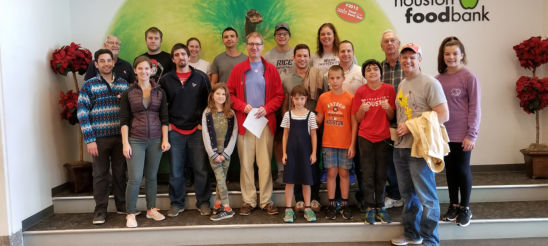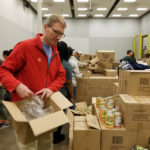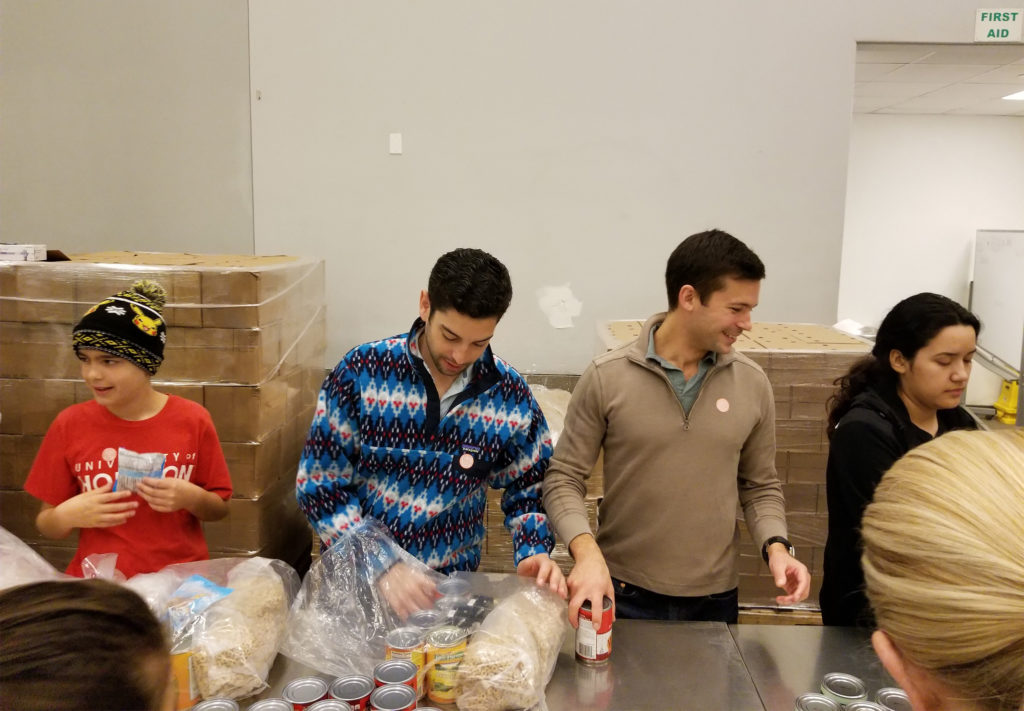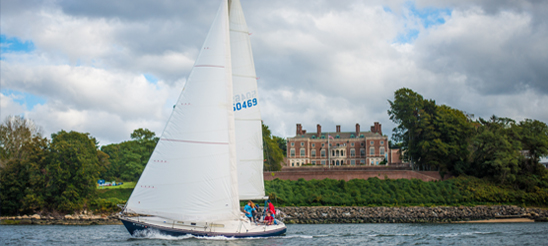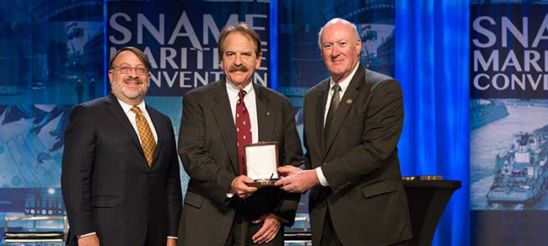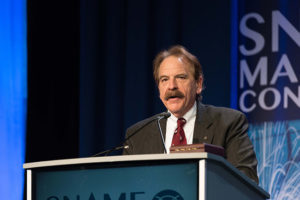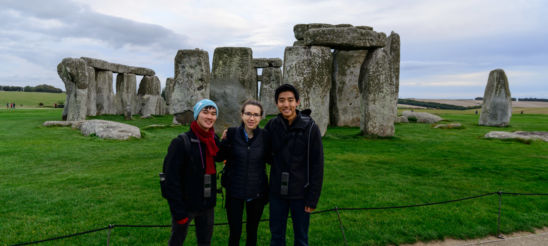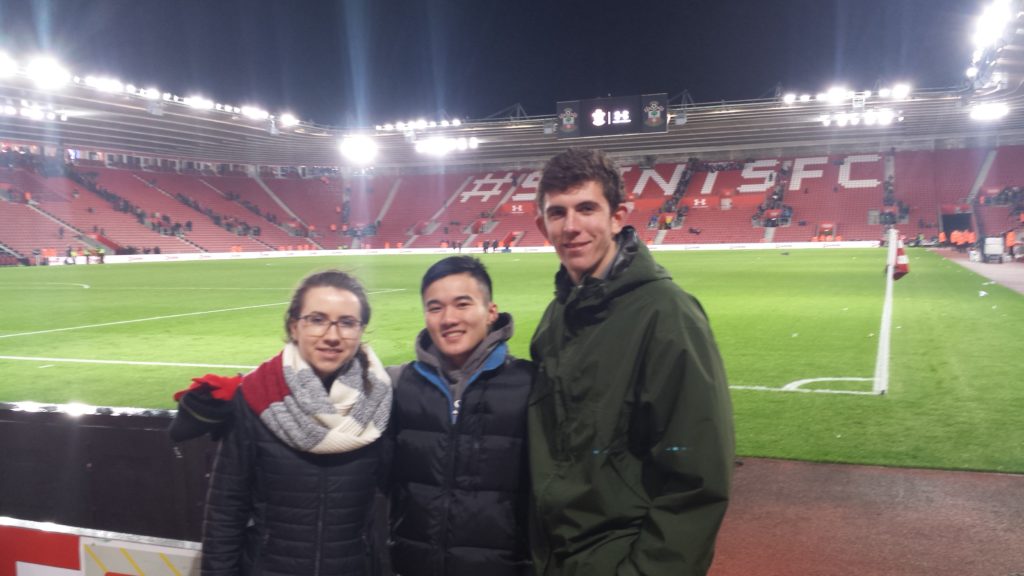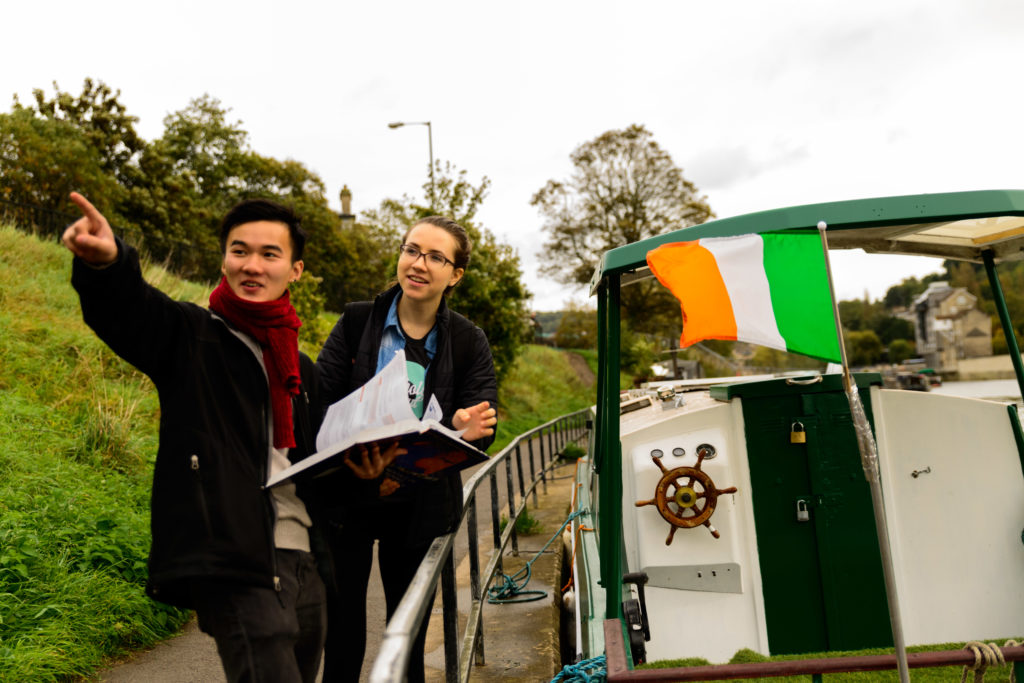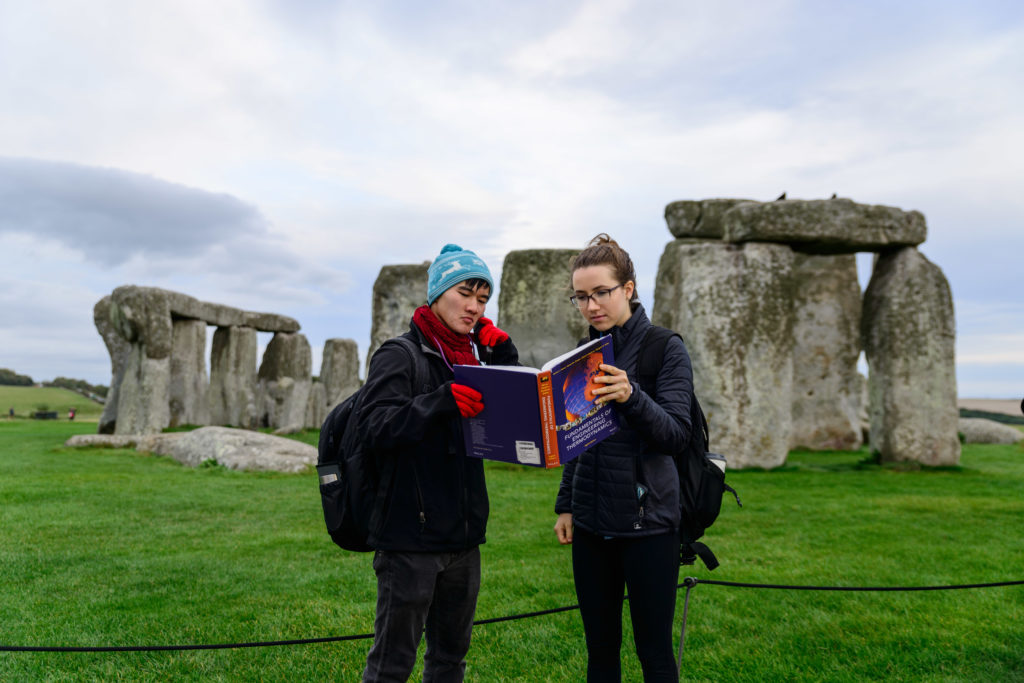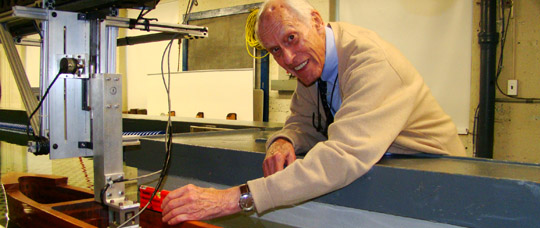Webb Alumni and Friends Volunteer at Houston Food Bank
Houston-based Webbies are giving back this holiday season! On Saturday, December 2nd, 2017, from 0800 to 1200, 19 members of the Webb Alumni Family volunteered at the Houston Food Bank. The volunteer event was organized by Erin McElroy ’15.
The majority of the group was involved with the Houston Food Bank Backpack Buddy program. The Backpack Buddy program works to fill that gap by providing nutritious, child-friendly food for school children to take home over the weekend.
Through the Backpack Buddy program, the Houston Food Bank, works in partnership with participating schools, schools district delivery sites, and other community partners, to ensure that the food sacks are distributed to children on every Friday during the school year.
Webb Dean, Professors attend Middle States Self-Study Institute Workshop
Dean Werner, Assistant Dean Harris, and Professors Martin and Onas attended a Middle States Self-Study Institute in Philadelphia, November 6-8. The Middle States Commission on Higher Education (MSCHE) is one of two organizations that accredit Webb Institute. The workshop focused on the new MSCHE standards for reaccreditation and provided information on the way in which colleges and universities should work toward preparing their next self-study assessment reports. Webb will submit its self-study report in the fall of 2019, and there will be a team visit and evaluation in the spring of 2020. For details, see below.
About Middle States Accreditation:
Purpose of Middle States Accreditation
“Middle States accreditation is an expression of confidence in an institution’s mission and goals, its performance, and its resources. An institution is accredited when the educational community has verified that its goals are achieved though self-regulation and peer review. The extent to which each educational institution accepts and fulfills the responsibilities inherent in the process of accreditation is a measure of its commitment to striving for and achieving excellence in its endeavors.”—Standards for Accreditation and Requirements of Affiliation, Thirteenth Edition, MSCHE, 2015.
There are fifteen Requirements for Affiliation and seven Standards for Accreditation. All must be addressed in the design document and the self-study report. A school’s reaccreditation plan can follow either a Standards or a Priorities approach. Webb’s self-study will be designed in terms of a Standards approach. See Standards for Accreditation and Requirements of Affiliation (Thirteenth Edition, MSCHE Documents below).
Schedule of upcoming events
- Telephone or Skype conference with MSCHE liaison, Ellie Fogarty, to discuss progress on assessment design document, January 2018
- Progress reports submitted to liaison for comment, January and February 2018
- Webb’s design document completed by March 1, 2018
- Design document submitted to liaison by March 1, 2018
- Liaison responds to design document
- Liaison visits campus to talk with President Michel, representatives from the BOT, faculty, administration, staff, and students, in late March or early April 2018.
Evidence Inventory
Documents pertaining to our assessment process are currently available on campus. These documents will also become part of Middle State’s Evidence Inventory (EI), a portal that Middle States will create for Webb personnel, both on and off campus; for our liaison; and finally, for the team of peer evaluators who will evaluate our report and visit the campus in early 2020. In other words, the EI will be an ongoing central repository of all documents pertinent to Webb’s assessment and reaccreditation process. These documents will be referred to in both the self-study report per se and in the appendices to the report.
Steering Committee
Webb’s Steering Committee, which will direct the various aspects of the assessment process, is composed of the following Webb faculty and staff:
- Assistant Dean Richard Harris and Professor Mike Martin (Co-chairs)
- Dean Matthew Werner
- Professor Adrian Onas, Coordinator of ABET Assessment
- Lauren Carballo, Director of Admissions and Student Affairs
- Rhonda Lightcap, Director of Financial Affairs
- Anthony Zic, Director of Development
- and, in addition,
- Jon LaBerge, Vice Chairman, Webb Institute BOT; Chair of Finance Committee
- Jennifer Waters, Associate Dean for Academic Affairs, United States Naval Academy
MSCHE Documents
Following is a list of Middle States documents central to our upcoming self-study report:
- Standards for Accreditation and Requirements of Affiliation (Thirteenth Edition) https://www.msche.org/publications/RevisedStandardsFINAL.pdf
Professor John C. Daidola, PhD, P.E. Awarded David W. Taylor Medal at 2017 SNAME Maritime Convention
Photo above: Chairman of the Board Bruce Rosenblatt, Professor John C. Daidola, and SNAME President Martin Toyen.
On October 23, 2017, Webb Institute Professor of Structural Engineering, Professor John C. Daidola, P.E., received The David W. Taylor Medal at this year’s SNAME Maritime Convention in Houston, Texas.
The David W. Taylor Medal is the highest award SNAME confers. The award is named after the man who built the first experimental towing tank in the United States, recognizes contributions to the development of future maritime systems through the creation of technology based on research. Professor Daidola was selected for this year’s medal for his notable achievements in naval architecture and marine engineering.
In addition to receiving the David W. Taylor Medal, Professor Daidola presented a paper at the convention on pontoon boat instability in waves. In his paper, Dr. Daidola investigates the stability of pontoon boats running in waves utilizing a quasi-static analysis considering the conditions for stable equilibrium and the limits where instability can be expected.
The variables include the wave environment as well as the principal characteristics of the vessels themselves. The procedure identifies limiting conditions as well as providing a basis for developing vessel proportions appropriate for expected wave conditions. The procedure is applied to several vessel design conditions. The results of this study should be useful in considering both the design of these vessel types as well as identifying limitations for their application.
About Professor John C. Daidola, PhD, P.E:
Dr. John C. Daidola, P.E. is a graduate of University of Michigan and Stevens Institute in naval architecture and marine engineering. He has authored over 80 publications on a variety of subjects of interest to the industry. Dr. Daidola is a licensed engineer, currently registered in eight states. He has been employed by Newport News Shipbuilding, the naval architecture and marine engineering firms of M. Rosenblatt & Sons, Inc., and successors as well as John J. McMullen Associates, and as an Adjunct Professor at Stevens Institute and U.S. Merchant Marine Academy.
Currently, Dr. Daidola is an Assistant Professor of Structural Engineering at Webb Institute and the President of his own naval architecture and marine engineering firm, AENY. He is a Fellow of SNAME and has been active in the organization, including as its first Vice President Technical.
*Photos courtesy of SNAME
Student Blog: Sophomores Take Southampton
By Jonathan Wang ’20, Galen Ng ’20, Mary McGuinness ’20, and Max Pierce ’20
Five months, four Webbies, a foreign country, and a mission to meet Ed Sheeran, eat the best fish and chips in England, get hired at Lloyd’s Register, marry into the Royal Family, make it to class on time.
Southampton University, with a Webb factor of roughly 240, is proving to be a bit of a college culture shock for the four of us. Here, we are slowly learning how to be real people and behave in social situations that are not comprised of only Webbies. And even though we would do questionable things to have Chef Wiener fly here to cook for us, we are very excited to be across the pond broadening our perspective and learning Ship Science just steps away from Lloyd’s Register.
It has only been three weeks in England so far, and while we have not met the Queen yet, we have learned a few things while here:
- Southampton has neat ships: We discovered this at the Southampton Boat Show. We also gained a taste for luxury, seven-figure yachts. After stepping aboard the biggest and most luxurious yachts on display, we are now hoping to spend Sea Term sailing on a megayacht.
- Boldrewood Innovation Campus is pretty awesome: As Shippies here at Southampton, some of our classes are located at a new campus called Boldrewood. The modern looking campus is brand new and has buildings for the university and Lloyd’s Register. It does not disappoint inside either as it is home to a 138-meter towing tank, UAV labs, and a large computer lab which we’ve used to learn FEA and CFD.
- Walking is hard: Traveling to classes has been one of the biggest changes for us. When a class finishes, we must gather our belongings and walk across the campus to the next lecture hall. We also often have classes at other campuses, which means walking an additional 0.8 miles each way. Gone are the days of rolling out of bed at 8:59 AM and hightailing it into the classroom or napping between classes. We now have to factor in half an hour in the morning to get from our dorm to classes
- We are in more societies than just SNAME: From Cake Decorating Society to Actuarial Science, there’s a society for just about anything. Between the four of us, we’ve joined societies including Break Dancing, Water Polo, Athletics and Cross Country, and Pottery.
- The Bubonic Plague a.k.a. Fresher’s Flu was never actually eradicated: Turns out when you squeeze hundreds of freshers together in dorms and lecture halls, the flu spreads like wildfire. We’ve all been sick to some degree, and the frequency of coughs in lectures is at about 3 seconds right now. Hooray for the Cough Choir!
- Stonehenge rock: Although it is smaller than it appears to be on the cover of National Geographic, it is still impressive when you consider the builders somehow managed to stack some massive rocks on top of each other. While visiting Bath before Stonehenge, we admired the architecture, toured some beautiful churches, and most importantly, had English tea. Mary particularly enjoyed the jam, Jonathan feasted on the clotted cream (to Galen’s disgust), and Galen devoured a peanut butter fudge brownie. On the trip, we also saw the beautiful English countryside and many sheep.
- Chef Weiner is a blessing: We took the lazy route and chose a part-catered meal plan instead of cooking all our meals. Frankly, the food served in our dorm leaves much to be desired. It is just not the same as Chef Weiner’s meals. Just thinking about all day bagels, cereal parties, fruit, and the salad bar brings tears to our eyes. We miss it all.
Of course, we are here at Southampton to study. To make sure everyone back at Webb knows we are not slacking off, we have evidence of our studiousness.
In Memoriam – Professor Emeritus Jacques Hadler
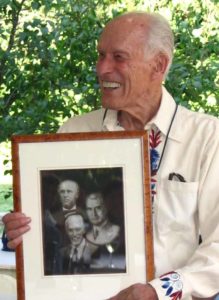 During the early morning hours of Thursday, October 19th 2017, we lost a beloved friend. Professor Emeritus Jacques Hadler will be sorely missed on the Webb Institute campus.
During the early morning hours of Thursday, October 19th 2017, we lost a beloved friend. Professor Emeritus Jacques Hadler will be sorely missed on the Webb Institute campus.
Falling ill in the spring, requiring hospitalization and then physical rehabilitation, Professor Hadler moved home to Maryland in June. Continuing his physical rehabilitation there, he regained strength and was enjoying time with his family. He was with his family as he passed.
Professor Hadler came to Webb as Director of Research from 1979 and 1983; was Dean from 1983 and1987 and again from 1991 and 1998. He was the J. J. Henry Professor of Naval Architecture from 1989-2001. Webb Institute awarded him an honorary Doctor of Science degree in 1993, the highest honor Webb can bestow. Professor Hadler taught a countless number of students over his time at Webb, once being referred to as a Propeller God.

